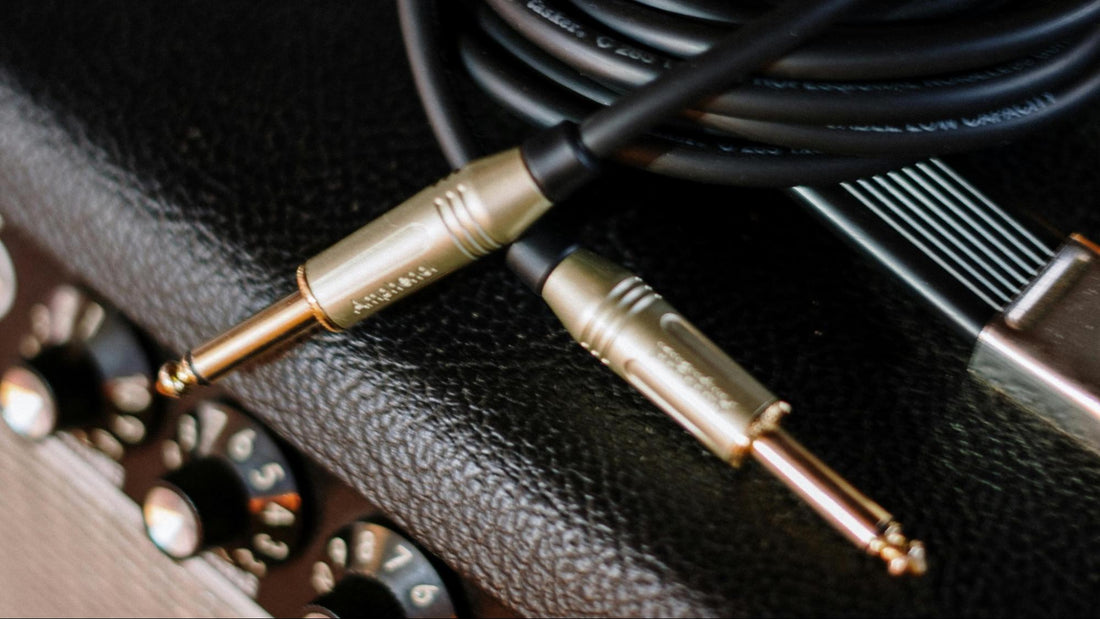Why You Should Care About Your Guitar Cables
Guitarists spend hours dialing in the perfect amp settings, stacking pedals just right, and chasing the ultimate tone. But one piece of gear is often overlooked: the humble instrument cable.
It's easy to assume a cable is just a wire: plug it in and it works. But in reality, the cable you choose can subtly shape your tone, introduce unwanted noise, or even hold back your entire rig. So, do cables affect your guitar tone? Let's break it down.

What Happens to Your Signal in a Cable?
When you plug your guitar into an amp or pedalboard, your signal travels as an analog electrical current through a cable's internal conductor, usually copper. Along the way, a few key things can happen:
- Some of the signal's high frequencies may be absorbed (depending on length and materials)
- Outside interference, like hum or buzz, might sneak in
- Poor connections could cause dropouts or static
The cable doesn't just carry your tone, it can shape it. While the differences may be subtle compared to a new pedal or amp, they're still worth understanding, especially if you're serious about your sound.
Key Cable Factors That Influence Tone
Cable Length
The longer your cable, the more capacitance it introduces, which can result in a noticeable loss of high frequencies. A 10-foot cable is often ideal for most setups, but the tone degradation becomes more apparent once you go beyond 20 feet. For players using long runs or complex rigs, using a buffer or high-quality cable can help preserve your signal.
Cable Quality
Not all cables are created equal. High-quality cables use better internal materials, like low-resistance copper and multi-layer shielding, which preserve tone and reduce noise. Cheaper cables often use thinner wire, minimal shielding, and less durable jacks, increasing the chances of signal loss, hum, or breakage over time.
Connectors
The plugs on your cable matter too. Though the tonal difference is minimal, gold-plated connectors resist corrosion better than nickel ones. More important is how securely they fit and how well they're soldered. Poor connections can cause crackling, intermittent signals, or failure at the worst time.
Shielding and Noise Rejection
Good shielding blocks interference from power supplies, lights, and other electronics. A poorly shielded cable can introduce unwanted hum, especially with high-gain amps or fuzz pedals. Braided or multi-layer shielding is typically more effective and durable than basic foil designs.
Do You Always Need Expensive Cables?
Not necessarily. Expensive cables often offer premium materials, lifetime warranties, and robust construction, which can be worth it for touring musicians or studio work. However, a reliable mid-priced cable from a trusted brand can deliver outstanding results for home players or casual gigs without breaking the bank. What matters most is the balance between durability, tone integrity, and peace of mind.
Tips for Choosing the Right Cable
- Keep cables as short as your setup allows
- Invest in cables with solid shielding and reliable connectors
- Don't ignore patch cables — bad ones can affect your whole signal chain
- Wrap and store cables properly to extend their lifespan
- Look for lifetime warranties when possible — many reputable brands offer them
Our Personal Recommendation: Monster Cable SP2000-I-12WW Instrument Cable - 12 foot
Frequently Asked Questions
Do Gold Connectors Sound Better Than Nickel?
While gold-plated connectors resist corrosion better than nickel, the difference in actual tone is negligible. The main benefit of gold is durability and reliable contact over time, especially in humid or harsh environments.
Can Cheap Cables Ruin My Tone?
Cheap cables can introduce problems like increased noise, interference, or signal loss, especially if they use low-quality materials and poor shielding. While they may not completely ruin your tone, they can reduce clarity, add unwanted hum, or cause reliability issues during gigs or recording sessions. Investing in cables that balance quality and price is better than buying the absolute cheapest options.
What Length of Cable Should I Use?
The shorter the cable, the better your tone will stay intact. Cable length affects capacitance, which can roll off high frequencies and dull your sound if the cable is too long. For most setups, keeping cables under 20 feet prevents noticeable tone loss. Longer runs may require buffered pedals or specialized cables designed to preserve signal quality.
Should I Worry About Patch Cables?
Yes! Patch cables are often overlooked but can be the weakest link in your pedalboard. Low-quality patch cables with poor shielding or cheap connectors can introduce noise and degrade the signal between pedals. Investing in solid patch cables can significantly improve your overall tone and reliability.

Conclusion
Cables might seem like a simple accessory, but they play an essential role in preserving your guitar tone and keeping your rig noise-free. While not every player needs the most expensive cable on the market, understanding factors like cable length, quality, connectors, and shielding can help you make smarter choices.
A well-made cable won't magically transform your sound, but a poor one can hold it back. So next time you're tuning your tone, don't overlook the humble cable, it's the vital link that connects your guitar to your sonic identity.
More Interesting Reads:
Essential Guitar Pedals for Beginners | What Pedals Should I Buy First?
How to Set Up Your Pedalboard | Guitar Pedal Order Explained
Pedal Stacking 101: Combining Effects for Unique Sounds
Bonus: Use the code IASN10 at checkout for an extra 10% discount!


